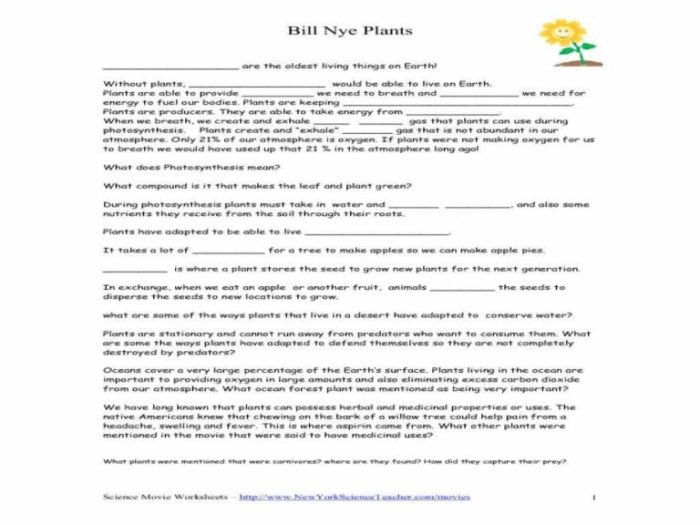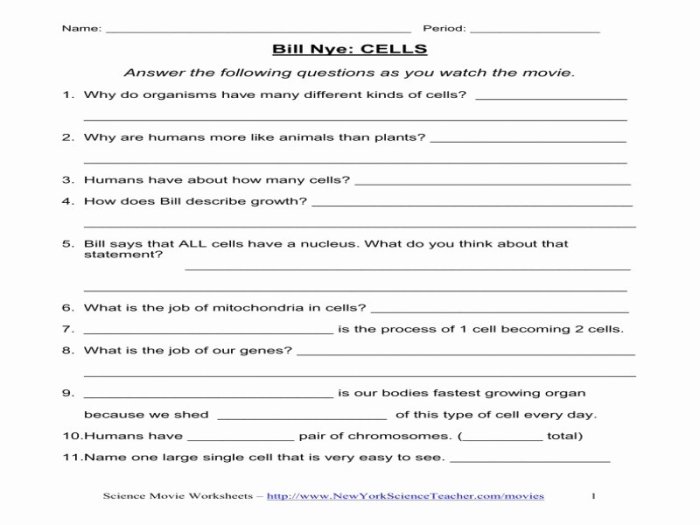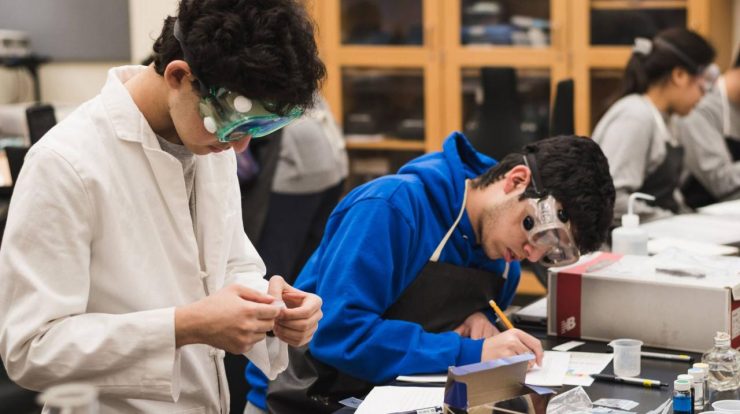Dive into the fascinating world of plants with Bill Nye Plants Answer Key. This comprehensive guide unlocks the mysteries of plant life, providing insights into photosynthesis, growth, development, and conservation. Prepare to be amazed as we explore the incredible contributions of Bill Nye to plant science.
Bill Nye, the beloved science educator, has dedicated his career to making complex scientific concepts accessible and engaging. His passion for plants shines through in his experiments, demonstrations, and educational initiatives, inspiring a new generation of plant enthusiasts.
Bill Nye’s Contributions to Plant Science

Bill Nye, an American science educator and engineer, has significantly contributed to the field of plant science through his engaging and informative educational programs and demonstrations. Nye’s background in mechanical engineering and his passion for science have fueled his interest in plant biology, leading him to incorporate plant science concepts into his educational content.
Experiments and Demonstrations
Nye has conducted numerous experiments and demonstrations related to plants, showcasing the fascinating processes of plant growth, photosynthesis, and plant responses to environmental stimuli. In one notable experiment, Nye demonstrated the importance of sunlight for plant growth by exposing plants to different light conditions and observing their growth patterns.
If you’re curious about the answer key for Bill Nye’s lesson on plants, you can find it online. Meanwhile, if you’re looking for a thought-provoking read, check out “Night Test” by Elie Wiesel, a powerful novel that explores the horrors of the Holocaust.
After reading Wiesel’s work, you’ll have a newfound appreciation for the fragility of life and the importance of perseverance. To learn more about “Night Test,” click here . Don’t forget to return to Bill Nye’s answer key to ace your next science test!
Importance of Plant Life, Bill nye plants answer key
Nye emphasizes the crucial role of plants in our ecosystem and advocates for their conservation. He highlights the significance of plants as food sources, oxygen producers, and air purifiers, underscoring the interconnectedness of plant life and human well-being.
Bill Nye’s Plant Experiments
Bill Nye, the renowned science communicator, has conducted numerous experiments to explore the fascinating world of plants. His investigations have shed light on essential processes such as photosynthesis, plant growth, and development.
Photosynthesis Experiments
One of Nye’s most notable contributions is his experiments on photosynthesis. He devised simple and engaging demonstrations to illustrate the process by which plants convert sunlight, carbon dioxide, and water into glucose and oxygen. Through these experiments, he showcased the critical role of chlorophyll and the significance of light intensity and wavelength in photosynthesis.
Plant Growth and Development Demonstrations
Nye has also conducted numerous demonstrations to elucidate plant growth and development. He has explored the effects of various environmental factors, such as light, temperature, and water availability, on plant growth patterns. His experiments have provided valuable insights into the intricate mechanisms that govern plant development, including seed germination, root growth, and stem elongation.
Contributions to Our Understanding of Plants
Bill Nye’s plant experiments have made significant contributions to our understanding of plant biology. His experiments have not only provided visual and hands-on demonstrations of fundamental plant processes but have also stimulated further research and exploration in the field. His work has helped to engage the public with plant science and inspire future generations of scientists.
Bill Nye’s Plant Education Initiatives
Bill Nye has made significant contributions to plant science education through his various programs, videos, books, and other resources. His initiatives aim to engage the public, particularly young people, in the fascinating world of plants.
Nye’s educational efforts have had a profound impact on public awareness of plants. His engaging and accessible approach has helped foster a greater appreciation for the role plants play in our lives and the environment.
Videos and Books
Nye has produced numerous educational videos and books on plant science. His popular television series, “Bill Nye the Science Guy,” featured several episodes dedicated to plants, covering topics such as photosynthesis, plant growth, and the importance of plants in the food chain.
In addition to his television work, Nye has authored several books on plants, including “Bill Nye’s Great Big Book of Science” and “Bill Nye’s Science Fair Projects: Great Science Fair Projects That You Can Build Yourself.”
Educational Programs
Beyond his videos and books, Nye has also developed educational programs focused on plant science. His organization, The Planetary Society, offers a range of educational resources on plants, including lesson plans, activities, and videos.
Nye has also partnered with other organizations to promote plant education. For example, he has collaborated with the National Science Teachers Association (NSTA) to create educational materials on plant science for teachers and students.
Bill Nye’s Plant Advocacy

Bill Nye has been a vocal advocate for plant conservation, recognizing their crucial role in maintaining the planet’s health and biodiversity. He emphasizes the need to protect and preserve plant species, especially those facing threats from habitat loss, climate change, and pollution.
Plant Conservation Campaigns
Nye has participated in various campaigns and initiatives aimed at protecting plants. One notable example is his involvement in the “Save the Monarchs” campaign, which raises awareness about the decline of monarch butterfly populations due to habitat loss and pesticide use.
He has also spoken out against the use of neonicotinoid pesticides, which have been linked to the decline of bee populations.
Importance of Plant Biodiversity
Nye stresses the importance of preserving plant biodiversity for the health of the planet and human well-being. Plants provide essential ecosystem services, such as oxygen production, carbon sequestration, and water purification. They also serve as a vital food source for animals and humans, and many plants have medicinal properties.
By protecting and conserving plant biodiversity, we ensure the continued availability of these vital resources and support the overall health and stability of the planet.
Query Resolution: Bill Nye Plants Answer Key
What is Bill Nye’s background in plant science?
Bill Nye holds a Bachelor of Science degree in Mechanical Engineering from Cornell University and a Master of Science degree in Engineering from Stanford University. While his formal education focused on engineering, his passion for plants has led him to become an ardent advocate and educator in plant science.
What are some examples of Bill Nye’s experiments or demonstrations related to plants?
Bill Nye has conducted numerous experiments and demonstrations to illustrate plant science concepts. One of his most famous experiments involves using a clear plastic bag to demonstrate the process of photosynthesis. He has also demonstrated plant growth and development by growing plants in different environments and conditions.
How have Bill Nye’s experiments contributed to our understanding of plants?
Bill Nye’s experiments have helped to make plant science more accessible and engaging to the general public. By simplifying complex concepts and using everyday materials, he has made it easier for people to understand the vital role plants play in our ecosystem.
What are some examples of Bill Nye’s educational programs on plants?
Bill Nye has created several educational programs on plants, including his popular television show “Bill Nye the Science Guy.” He has also written books and developed online resources to help people learn about plant science.
What is Bill Nye’s perspective on the importance of understanding plant life?
Bill Nye believes that understanding plant life is essential for our survival. Plants provide us with food, oxygen, and other resources that are necessary for life. He also believes that plants play a vital role in the environment, helping to regulate the climate and provide habitats for animals.

